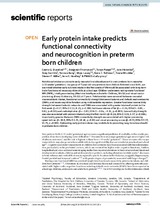| dc.description.abstract | Nutritional intake can promote early neonatal brain development in very preterm born neonates
(< 32 weeks’ gestation). In a group of 7-year-old very preterm born children followed since birth, we
examined whether early nutrient intake in the frst weeks of life would be associated with long-term
brain function and neurocognitive skills at school age. Children underwent resting-state functional
MRI (fMRI), intelligence testing (Wechsler Intelligence Scale for Children, 5th Ed) and visual-motor
processing (Beery-Buktenica, 5th Ed) at 7 years. Relationships were assessed between neonatal
macronutrient intakes, functional connectivity strength between thalamic and default mode networks
(DMN), and neuro-cognitive function using multivariable regression. Greater functional connectivity
strength between thalamic networks and DMN was associated with greater intake of protein in the
frst week (β= 0.17; 95% CI 0.11, 0.23, p < 0.001) but lower intakes of fat (β= − 0.06; 95% CI − 0.09, −
0.02, p= 0.001) and carbohydrates (β= − 0.03; 95% CI − 0.04, − 0.01, p = 0.003). Connectivity strength
was also associated with protein intake during the frst month (β= 0.22; 95% CI 0.06, 0.37, p = 0.006).
Importantly, greater thalamic-DMN connectivity strength was associated with higher processing
speed indices (β= 26.9; 95% CI 4.21, 49.49, p = 0.02) and visual processing scores (β= 9.03; 95% CI 2.27,
15.79, p= 0.009). Optimizing early protein intake may contribute to promoting long-term brain health
in preterm-born children. | en_US |

